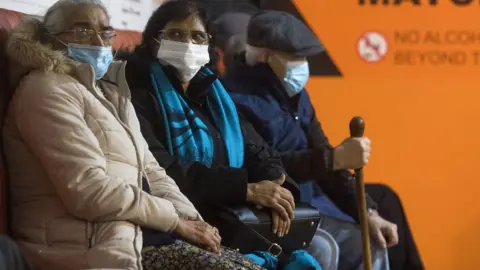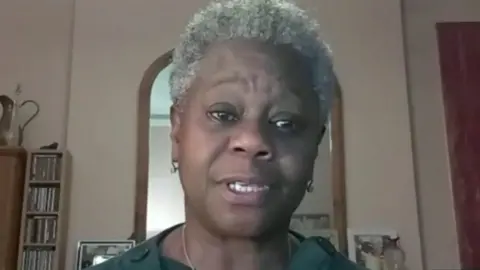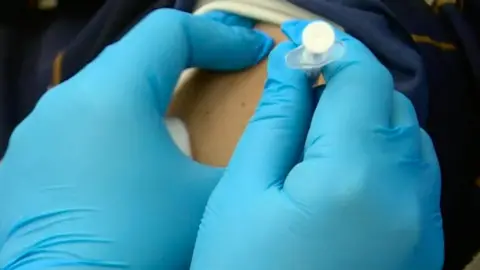WhatsApp rumours fear over BAME Covid vaccine take up
 Kirsty O'Connor
Kirsty O'ConnorPeople from ethnic minorities in the UK are significantly less likely to take the coronavirus vaccine - with warnings of targeted online scaremongering.
A study from the Royal Society for Public Health found 57% of black, Asian and minority ethnic (BAME) people said they would take the vaccine.
This compared with 79% of white people who would take a Covid vaccine.
Vaccine minister Nadhim Zahawi warned of the impact of conspiracy theories being shared online.
Anti-vaccination messages
"Anti-vaccination messages have been specifically targeted" at some ethnic and religious communities, said Christina Marriott, chief executive of the Royal Society for Public Health (RSPH).

"People send WhatsApps, videos, all kinds of messages - if you don't know where that's coming from then it is very likely to be inaccurate," said the vaccine deployment minister, Mr Zahawi, asking people to look at health information from official sources rather than rumours.
"This is an incredibly well developed scientific endeavour and I would urge everyone to take the information, read it and then make your mind up," he said.
Dame Donna Kinnair, chief executive of the Royal College of Nursing, said the apparent reluctance among BAME communities flew in the face of those most in need of vaccinations - which she had seen first-hand.
"For someone like me, who stood in the Nightingale, and saw row after row of BAME patients being ventilated - and seeing how it disproportionately affected people from the BAME community - I'd be urging everybody to take the vaccine," she said.

Among the vaccine rumours, rejected as groundless by independent health experts, have been suggestions that vaccines could change someone's DNA or that it would inject a microchip.
Rumours about vaccines is a problem for many online platforms, not just WhatsApp, - but the messaging service is using spam detection technology to control how information is shared and has partnered with reliable sources of information, including the World Health Organization, on a chatbot for Covid questions.
Jabeer Butt, head of the Race Equality Foundation, said the findings on a lower ethnic minority take up were "particularly worrying".
He warned the "Covid vaccine may not reach the communities" who had been worst affected and most "disproportionately impacted" by the virus.
The study, based on a survey of more than 2,000 adults across the UK, revealed different levels of trust in the vaccination process among social and ethnic groups.
Wealth gap
On average, more than three-quarters of people would take a coronavirus vaccine if they were advised to by a doctor or health professional.
People on lower incomes also seemed less confident about a vaccine, with a wealth gap in take-up:
- 84% of high earners planning to get vaccinated, compared with 70% of low earners.
- 55% of the Asian community would take a vaccine, the lowest acceptance
- 14% in London were "very unlikely" to get vaccinated, the highest region for rejections
- Women more reluctant to take the vaccine than men
Ms Marriott, chief executive of the RSPH, said the findings were "highly concerning" that people from ethnic minorities and on low incomes were less willing to be vaccinated.
"These are exactly the groups which have suffered most through Covid.
"They continue to be most at risk of getting ill and most at risk of dying. So the government, the NHS and local public health must rapidly and proactively work with these communities," she said.
